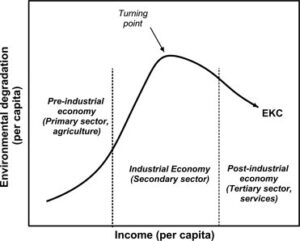Last month, the world watched as leaders gathered at COP26 in Glasgow to discuss climate change. A popular theme throughout the conference was that of green growth in Africa. African countries have been under pressure usually from Western leaders, to pursue green-powered economic growth. Even though Africa emits fewer Greenhouse Gases (GHG) than any other region, the region will be the biggest loser if this notion of green-driven growth persists.
A little over 200 years ago, the first Western countries started to use dirty fossil fuels for their industrial revolutions. As David Pilling, the Africa editor of the Financial Times, notes, the formula for prosperity in advanced countries has been something like this: “get dirty, get rich, get clean”. Ironically, advanced economies have now become proponents for the “go green, get rich” formula for Africa, which is likely not even be feasible.
The world watched as leaders gathered at COP26 in Glasgow recently to discuss the next steps to addressing climate change. A popular topic during this conference was green growth in Africa.
There has been a lot of pressure on African countries to pursue a green-driven growth agenda despite being the least responsible for climate disruption. Even though African countries are the least contributors of Greenhouse Gas (GHG) emissions, they will continue to be the biggest losers if current conditions persist. The East African region is already experiencing the adverse effects of climate change as more than 3 million people in Mozambique, Malawi, and Zimbabwe have been internally displaced by cyclones over the last few years.
A little over 200 years ago, the first Western countries started to use dirty fossil fuels for their industrial revolutions. As David Pilling, the Africa editor of the Financial Times, notes, the formula for prosperity in advanced countries has been something like this: “get dirty, get rich, get clean”. Ironically, advanced economies have now become proponents for the “go green, get rich” formula for Africa, which is likely not even be feasible.
The path to development and the use of fossil fuels are intertwined. For African countries to shift from agrarian to industrialized economies, they will have to rely on fossil fuels. While many have suggested the possibility of a ‘green industrialization’ in Africa, this would require huge amounts of money. The lack of necessary funds in African treasuries coupled with the recent failures of richer governments to honor their financial pledges to support African countries to go green means a ‘green industrialisation’ is unlikely.
The hypocrisy of developed countries is appalling, and developing countries have every right to call them out. In September 2021, the UK fired up its coal power plants due to surging gas prices to meet electricity needs. The UK knows it can always fall back on coal when it matters the most. Yet, its leaders are quick to call on the world to give up its use of coal. African countries are in a more desperate state than most nations, and if fossil fuels are the way to advance their economies, why should they be discouraged?
According to the Institute of Energy Agency (IEA), Sub-Saharan Africa is home to 75% of the world’s population without electricity. The IEA also estimates that about 910 million Africans live without access to clean cooking fuels and technologies. The widespread reliance on dirty fuels such as charcoal and wood plays a large role in the death of an estimated 2.5 to 4 million Africans who die every year from lung-related diseases.
Africans must be able to transition to alternative cooking energy sources such as liquefied petroleum gas, which has proven to be safer, cleaner, and have fewer emissions at the point of combustion than fuels such as coal or wood. Despite the falling prices of renewable energy sources such as solar and wind, prices and availability still vary largely in Africa and remain far too expensive for most of people on the continent.
Given the need to rely on fossil fuels for economic growth, should we just accept increasing emissions and environmental degradation in Africa?
Fortunately, there is a silver lining. One side of the climate argument that many environmental scientists and commentators subscribe to is the Environmental Kuznets Curve (EKC) hypothesis. The EKC suggests environmental degradation and economic growth increases in tandem in the early stages of economic growth. However, once incomes rise to a certain level, environmental degradation starts to decline (see Figure 1). This happens because as populations become wealthier, they can afford to care about the environment. With economic growth, people increasingly move to cities (which means ample farmland can return to nature), they can afford to protect biodiversity hotspots and are increasingly able to invest in greener energy sources.
Figure 1. An Environmental Kuznets Curve (EKC)

An extensive body of research has either confirmed or disproved the validity of the EKC hypothesis based on the sample of countries or periods studied. However, there is no evidence to dispute that countries in their early stages of economic growth depend on exploiting the environment through high emission activities to drive industrialization. In simple terms, the “get dirty, get rich, get clean” formula has worked for every rich region in the world, so why not let it work in Africa?
Pursuing a green economy in Africa is a worthy cause given the significant advantages for the people and their quality of life. However, Africa’s highest priority is economic growth and to achieve this by solely using renewable energy seems unlikely. African countries have the highest poverty rates in the world, with about 36% living in extreme poverty (those living on less than $1.90 a day), so the faster we move them out of poverty through economic growth, the more quickly they are able to afford cleaner energy sources, protect the environment, and enjoy a greener future.
The writer is the host of the “Dear Young Afrikan” Podcast and formerly an intern at the Initiative for African Trade and Prosperity.










